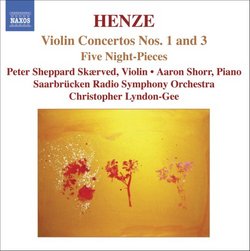For Henze, start here
E. Weed | Houston, TX | 03/13/2007
(5 out of 5 stars)
"Naxos has done us a great favor here once again: An excellent disc of well-chosen work by a 20th Century composer who ought to be at least somewhat better known. Henze's work is not for everybody; or perhaps I should say more specifically that it's possible to like some of Henze's work and yet have quite the opposite reaction to other parts of his output.
These violin concertos are stimulating, and often captivatingly lyrical, without being over the top, and represent an excellent place to start exploring Henze's music. Henze can write with a beautifully melodious voice, though it is within the context of extended tonality, much akin to Alban Berg. You might say he sounds like what he is: A German expatriate living in Italy. The first concerto, from 1946, is particularly under the Bergian influence, and is probably my favorite of the pieces presented. (In reading the headnote above, I worry that the description of the music suggests that it sounds more violent and tormented than it is; or at least than I hear it. It's not "easy listening", true, but much of it is delicate and graceful.)
The 3rd concerto is a tougher nut to crack, but has many lyrical moments, as do the Five Night Pieces. I'm still working on them, but I've enjoyed following the dialogue between the violin and the orchestra (or piano, as the case may be). However, one concerto at a time is usually enough for my ear, and I've been quite happy lately to concentrate on the first one.
The performances are exemplary and the sound is fine. If you like the Alban Berg of the Lulu Suite, you should definitely try this."
INTERESTING WORKS
Milan Simich | 07/03/2007
(4 out of 5 stars)
"Although the 2nd Violin Concerto of Henze's is to me the 'prize', both the early first and later 3rd should be performed more often. They are not difficult to listen to and offer the violinist lotsa 'meat'. The Night Pieces are a delight."
A very unschooled review
Julie M. Vognar | Berkeley, California United States | 07/14/2008
(5 out of 5 stars)
"I was an almost complete stranger to atonal music. I expected something emotionally and musically incomprehensibe to me--I bought the disc because Violin Concerto Numnber 3 dealt with three "portraits" from Thomas Mann's Doktor Faustus, and I thought--maybe I'll be able to get something out of it ( but actually thought that I'd start holding my ears, or leave the room, or something similar).
The first thing I noticed was that the violin playing was superlative. In fact, listening to music since I first heard this disc, I've found other violin playing less sure, less lyrical, less sweet, and less accomplished (Henze REALLY makes demands on the performer!).
Violin Concerto Number 3:
There emerged from the composition: lyrical, violent, sad... and then: loving, passionate, horrified, mourning, humorous, annoyed, ominous, self reriminating (!) (uh--five gunshuts? Yes! A trolly car? Yes!)
In fact, though not thematically, like "Peter and the Wold"--(remember that?) the three movements tell the history, almost liniarly, of the protagonist's relationships with Esmeraldda, Echo, and Rudolph S, each of whom have very important stories in the novel.
Suddenly, my focus shifted to my own life and feelings...why, these musical expressions can fit anyone's life! One doesn't hAve to read a 776-page novel to appreciate them.
The liner notes assure me that I'm wrong about the work; the man who wrote them, alas--he talks a lot about the book, but apparently neglected to read it. (Obviously, if Henze wanted to tell stories, he would be writing prose or poetry, not composing music....but the stories are there). In other words, in my musical ignorence, I am hearing literary things in music. I have a feeling many would consider this sacriligious.
Please forgive this musical amateur's opinions.
...But aren't there TWO examples of Tartini's "devil's trill" in the third movement?
I enjoyed the first concerto, too. I wondered--1946: the country Henze fled in 1933 had just been defeated in war...I thought I heard something of that.
But I may be all wrong. Read the other reviews, please."

